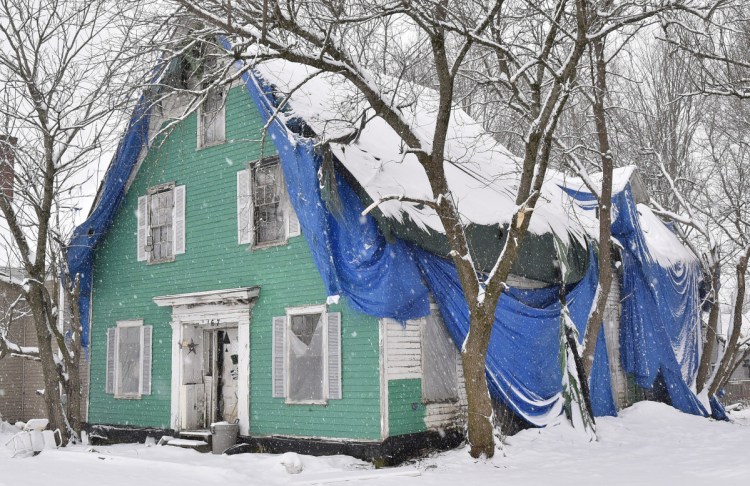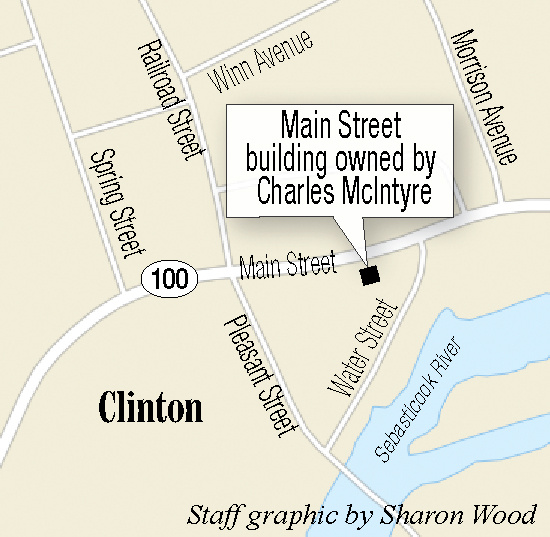CLINTON — Selectmen on Tuesday night declared a Main Street property a dangerous building, potentially ending a decadeslong dispute between the town and the homeowner.
At a packed public hearing at the Town Office, the selectmen unanimously voted to declare the home at 1167 Main St., which has been owned by Charles “Buddy” McIntyre since 1977, a dangerous building. During the meeting, McIntyre said he wanted to stay in his home and that the state was willing to help him make repairs. While he said the state wanted to make sure elderly people could stay in their homes, it was not clear who in the state he meant or what help they might offer. McIntyre left the meeting before the selectmen voted.
“That’s my home, and I wanted to live there for the remaining time of my life, or if I’m bought out,” he said.
Selectmen set a deadline of March to demolish the property. If McIntyre does not, the town could demolish the property at McIntyre’s expense.
During the meeting, Code Enforcement Officer Frank Gioffre said he inspected the interior and exterior of the building and found in a dilapidated state, with signs of rodents and rot throughout the house. He said a person could see the sky through the roof. He said there were extension cords running along the floor throughout the house, creating an unsafe environment.
“The building needs to be torn down. It should have been torn down years ago,” he said.
Peter Tuell, a civil structural engineer brought on by the town, said he conducted only a review of the exterior of the building. He did not go inside because he did not deem the home to be safe. He said the building could be a fire hazard, and he recommended it be razed.
A handful of residents spoke during the public hearing, all of them voicing concerns that the house was a dangerous building that needed to be torn down. Frank King said it was a long time coming.
“Enough is enough,” he said. “We’ve been driving by that place for 25 years. It’s just an embarrassment. It’s time for it to go.”
McIntyre had contended his home was not a dangerous building. While admitting the home did need some repairs — specifically to the roof, which has holes and is covered in blue tarps — he said health complications had prevented him from making repairs. He also said his belongings in his yard, some of which were stored in or around vehicles that have been repossessed, were not visually disruptive to neighbors. But dating back to the 1980s, McIntyre and the town battled over the condition of his home and his right to keep what the town deemed to be an illegal junkyard. McIntyre and the town have gone to court in the past, when the town tried to declare the home as a dangerous building in the 1990s. In 1994, the two sides battled over McIntyre’s right to build a full-sized gallows with a noose, which he built to demonstrate against what he perceived to be unfair treatment. The gallows were removed in 1998.
In 2006, the town ordered the demolition of McIntyre’s one-car garage. At the time, the town’s code enforcement officer wanted the garage declared a dangerous building, calling it structurally unsafe, unstable and hazardous. The garage had two big holes in its roof, the floor and sills had rotted and the building was pulling away from the house. McIntyre contended the building could be fixed. McIntyre was ordered to tear down the decaying garage, or else the town would demolish it at his expense.
McIntyre also still contends that a piece of land next to his property that was claimed by the town is still his. In 2007, the Maine Supreme Judicial Court upheld a ruling by a lower court that gave Clinton title to a piece of property next to McIntyre’s. That land was the site where the gallows once had stood, and McIntyre claimed it was his. The town succeeded in claiming the land as its own after failing to collect fees and fines from McIntyre.
McIntyre also has claimed that the town has treated him unfairly, evidenced by the town repossessing a number of vehicles from his yard in mid-December. He says all the seized vehicles were properly registered and on private property, so there was no grounds for taking them. He also claims that property of his was destroyed when the vehicles were taken.
The power was shut off the to the dilapidated building in December, and McIntyre has been living with his son in Winslow ever since. He said he fears being forced out his home, because he couldn’t afford rent on his fixed income, and doesn’t want to be forced into a nursing home.
Colin Ellis — 861-9253
cellis@centralmaine.com
Twitter: @colinoellis
Send questions/comments to the editors.






Success. Please wait for the page to reload. If the page does not reload within 5 seconds, please refresh the page.
Enter your email and password to access comments.
Hi, to comment on stories you must . This profile is in addition to your subscription and website login.
Already have a commenting profile? .
Invalid username/password.
Please check your email to confirm and complete your registration.
Only subscribers are eligible to post comments. Please subscribe or login first for digital access. Here’s why.
Use the form below to reset your password. When you've submitted your account email, we will send an email with a reset code.